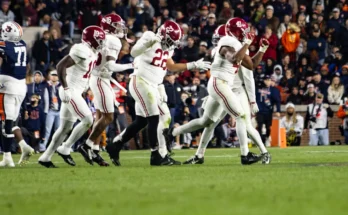Arch Manning Silences Doubters and Earns Full Respect of Texas Longhorns Locker Room with Maturity, Grit, and Leadership Under Pressure
When Arch Manning arrived at the University of Texas, the weight of his last name followed him like a shadow. The grandson of Archie Manning and the nephew of NFL legends Peyton and Eli Manning, Arch didn’t just come to Austin as another top-ranked recruit—he came as the presumed heir to a legacy that has defined quarterback excellence for generations. But as any football player knows, nothing is given in a locker room—not respect, not trust, not a starting role. And while hype is easy to generate on message boards and social media, earning the faith of teammates, especially at a Power Five program like Texas, takes something more. It takes grit. It takes patience. It takes humility. Over the past several months, Arch Manning has shown all of that and more—and in doing so, he’s earned something more valuable than any star ranking ever could: the full respect of the Texas Longhorns locker room.
It didn’t happen overnight. When Manning arrived in Austin, he was immediately surrounded by a buzz few freshmen ever experience. Media scrutiny intensified with every step he took, and comparisons to his uncles surfaced before he’d even taken a collegiate snap. Many of his teammates were aware of the name, but not all of them were convinced of the game. He wasn’t handed the keys to the offense. He wasn’t coddled. Instead, he went to work. Quietly. Relentlessly.
Manning’s first few months on campus were spent mostly under the radar. While some freshmen might have leaned into the fame or let it influence their demeanor, Arch chose a different route. He showed up early to meetings, asked questions, and watched film with intensity. He stayed late after practices, working with second-string receivers and walk-on defensive backs just to get reps in. He didn’t act entitled. He didn’t expect anything. He knew he had to earn it. That attitude quickly got the attention of veterans in the room—guys who had seen flashy recruits come and go, guys who knew that potential without work ethic meant nothing.
Then came spring camp. With every rep, Manning’s poise began to stand out. He made mistakes, but he never got rattled. He took hard hits in scrimmages and bounced back up with a nod to the defender. He encouraged teammates after dropped passes and took the blame for miscommunications. His demeanor never wavered. Slowly, players started to gravitate toward him—not because of his name, but because of how he carried himself. What mattered to them wasn’t his last name, it was his commitment to being part of the team, not above it.
One moment, in particular, shifted the perception dramatically. During a live scrimmage under the lights at DKR-Texas Memorial Stadium, Manning was inserted with the second unit against the first-team defense—a daunting challenge. The defense had been dominating most of the day, and energy was high. Manning took a couple of sacks early on and absorbed a blindside hit that knocked his helmet off. Most expected him to check out for a play. Instead, he waved off the trainer, jogged back to the huddle, and called the next play with urgency. The next drive, he led an 80-yard touchdown series that ended with a perfectly placed ball to a tight end in the corner of the end zone. The sideline erupted—not because it was Arch Manning, but because it was a kid who took his lumps and came back stronger.
After that, the respect shifted. “He earned it right there,” one defensive captain said afterward. “We test every young guy, especially the ones with hype. He didn’t back down. He stood tall. That’s how you earn the room.”
That’s what it came down to—earning the room. Coaches can talk, and analysts can predict, but in college football, especially in the locker room, respect is earned between the lines. Players look for the guy who’ll fight for that extra yard, the guy who’ll put the team first, the guy who leads not with his voice, but with his actions. Manning checked every box. What started as quiet skepticism turned into open admiration.
It’s not just what he’s done on the field, either. Teammates speak about his presence in the film room, where he’s often seen staying behind with assistant coaches and position players, breaking down tape in detail. He’s not just trying to learn his position—he’s trying to understand every nuance of the offense, every responsibility of every player. That kind of mental approach isn’t common, even among veteran starters. For a young quarterback to take that kind of initiative? That resonates.
He’s also made an effort off the field to connect with teammates. Whether it’s showing up to support fellow athletes at volleyball or softball games, sitting with walk-ons during team meals, or organizing offseason workouts and group chats, Manning has shown that he’s committed to more than just his own development—he’s committed to the brotherhood of Texas football. One upperclassman noted, “He doesn’t act like a celebrity. He’s just one of the guys. You forget sometimes that he’s a Manning. He just wants to win.”
There was perhaps no greater sign of his impact than when the quarterback competition started heating up during fall camp. The room was competitive, tensions naturally rose, and eyes turned to see how Manning would respond. Rather than getting caught up in the politics or the speculation, he doubled down on preparation. He stayed ready. He encouraged his competition. He celebrated other quarterbacks’ successes. That kind of maturity is rare in young players—especially in ones with national attention and NIL deals—but it was genuine.
It’s also been echoed by Head Coach Steve Sarkisian, who’s spoken at length about Manning’s growth. “Arch has been everything we hoped for and more,” Sarkisian said during media day. “He’s a competitor. He’s humble. He’s tough. And most importantly, he’s a great teammate. The guys in that locker room have his back because they know he’s got theirs.”
Leadership isn’t something that can be handed down from a family tree. It has to be cultivated. Earned. Tested. Arch Manning has done that. He hasn’t been perfect. He’s had growing pains. He’s been challenged physically and mentally. But in every instance, he’s responded like a player beyond his years. The Longhorns locker room isn’t impressed by legacy—they’re impressed by effort, resilience, and character. And Manning has shown all three.
As the season approaches, there’s still no guarantee of how much playing time he’ll see. He may start. He may not. But in many ways, that’s beside the point. What matters most is that Arch Manning has earned the trust of the men who matter most—his teammates. And when your teammates believe in you, when they fight for you, when they follow you—it means you’ve arrived. Not as a Manning. But as a Longhorn.
In a sport where hype often burns hotter than substance, where names can overshadow the work required to make them matter, Arch Manning has done what many thought would be impossible: he’s stepped out from under the shadow of his famous lineage and into the light of his own making. In the locker room, he’s not “Peyton’s nephew” or “Eli’s heir.” He’s just Arch. And that’s more than enough.
Through a combination of perseverance, humility, and steady leadership, Arch Manning has done what all great quarterbacks must eventually do—he’s earned the room. Not with flash, but with fight. Not with entitlement, but with effort. And in a Texas program hungry for its next great era, that kind of presence matters. Because when the pads are on, and the lights are bright, it’s not names that win games—it’s trust. And the Texas Longhorns trust Arch Manning.



